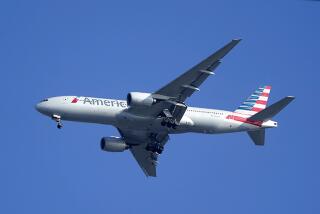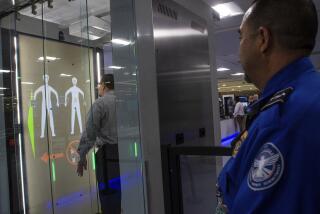Airport Officials Support Flight Personnel Checks
- Share via
John Wayne Airport officials Friday disagreed with critics who say a federal order requiring pilots and others to submit to security checks beginning Monday will disrupt operations. They pointed out that similar measures have been in in effect in Orange County for more than a week.
Some airline industry officials, including the chief of the national Air Line Pilots Assn., predicted long flight delays as a result of the security change announced Thursday by the Federal Aviation Administration.
Requiring pilots, flight attendants and other airport personnel to pass through the same security checks and X-ray machines as passengers “will create untold headaches,” Henry Duffy, head of the pilots association, warned Friday.
But officials at John Wayne disagreed, pointing out that major air carriers operating there have required employees, including flight crews, to clear security checks before boarding since last Monday.
The move has “hardly been noticed,” airport spokesman Alan Murphy said. “What does it take, 15 or 30 seconds?”
The new federal rule was ordered after the Pacific Southwest Airlines disaster, which was apparently caused by David A. Burke, a disgruntled former USAir employee who smuggled a gun aboard the plane at Los Angeles International Airport.
The day after Flight 1771 crashed Dec. 7, killing all 43 people aboard, PSA stepped up security checks of its employees at all airports, including John Wayne. Four days later, the other major carriers at John Wayne followed suit.
As a result, anyone at the airport moving from the ticket counters to boarding areas must pass through X-ray machines.
Baggage handlers, mechanics and others who use service gates to enter airports will not be affected, FAA spokeswoman Elly Brekke said. But steps are being taken to tighten security in those areas as well. Brekke said that a proposal is being drafted to require airports to install computerized locks at all gates, accessed only by special key cards.
“Within 30 days that proposal will be finished,” said Brekke, who is based at the agency’s Los Angeles International Airport office. “Our efforts to step up security have not ended.”
Brekke said FAA observers will be at John Wayne and other Southland airports Monday to make sure airlines are complying with the new rule. Those who don’t could face civil fines, she said.
At John Wayne Airport on Friday, one American Airlines flight attendant said tougher employee security is overdue.
“At most airports the attitude about security had become so casual that it was frightening,” said the attendant, who asked not to be identified. “It’s sad that it took a tragedy to prompt the airlines to respond.”
When asked about warnings of flight delays, the attendant responded: “Isn’t it worth a couple of extra minutes to make the flight safer? It took me all of about 45 seconds to pass through the detector.”
Current airport regulations allow individual air carriers to decide whether their employees must pass through metal detectors that screen most passengers. Workers at most airlines have identification badges that have allowed them to bypass security checkpoints.
Although security procedures vary from carrier to carrier, airline officials at John Wayne refused to discuss specifics about their procedures.
But Alan Becker, a spokesman for Dallas American Airlines, which operates out of John Wayne, said “it is absurd” to believe the new FAA rule will cause delays. Most airlines, he said require flight crews to arrive at least 40 minutes before departure, and flights are spaced throughout the day.
“Listen to some of those people and you’d think that 4,000 pilots pull up and arrive at the airport all at once,” Becker said.
While industry officials debated the merits of the FAA ruling, travelers said they welcomed the tougher security. Bob Wilkinson, an El Toro salesman who flys frequently, said the PSA incident “really rattled” him.
“You assume that the last people who are going to sabotage a flight is a pilot or airline employee,” Wilkinson said. “But now I don’t know. It’s nice to see the federal government react so quickly. Three cheers for the FAA.”
More to Read
Sign up for Essential California
The most important California stories and recommendations in your inbox every morning.
You may occasionally receive promotional content from the Los Angeles Times.










